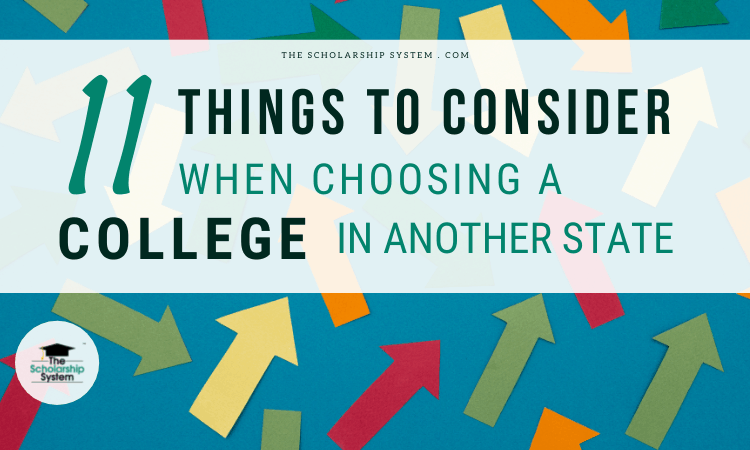Updated on January 6th, 2024
For college students, picking the right school is essential. The problem is, many students commonly overlook some of the things to consider when choosing a college in another state. They may make a selection on to later realize that the school can’t meet all of their needs. And when that happens, it can result in a lackluster college experience.
Understanding what to look for when choosing a college out-of-state is essential. It ensures your student considers every factor. That way, when they pick a school, they’ll know for certain that it’s a great fit. We also included a list of the states we’ve pulled data on to help you in your search!
If your student is trying to figure out how to pay for college tuition and other educational expenses, scholarships can make it easier. If you and your student want to learn more about how scholarships can help them graduate debt-free and how to find amazing scholarship opportunities, sign up for our free college scholarship webinar! Take a trip over to http://thescholarshipsystem.com/freewebinar to reserve your spot today.
If your student is trying to figure out what to consider when choosing a college, here’s what they need to know.
Why You Need to Look Beyond Academics When Choosing a College
While students should certainly take a close look at the academic programs, it’s also crucial to look beyond them. There are many more factors to consider when choosing a college to ensure a school is a great fit, so they need to be part of the college decision equation.
If your student focuses solely on academics, they may choose a college that doesn’t offer them the right lifestyle. Additionally, they may find themselves in a region that costs far more than they expected, have limited employment opportunities, or includes other hindrances that prevent them from excelling.
Having a great college experience involves so much more than just the classes that are available and the degree your student can earn. That’s why it’s crucial that they know what to look for when choosing a college beyond academics.
11 Things to Consider When Choosing a College in Another State
1. Total Cost of Attendance
One of the most important things to consider when choosing a college is the total cost of attendance. Out-of-state students commonly have to pay higher tuition rates, something that may catch some students off-guard.
Additionally, they may have to shoulder expenses that they wouldn’t have if they remained at home while going to school. Out-of-state students usually have little choice but to pay for housing and food. If they don’t dorm, then students may also have to cover utilities and internet. Plus, many out-of-state students have to handle a range of transportation costs, both for traveling locally and visiting home.
There are other costs out-of-state students may encounter that in-state students might be able to avoid. As a result, your student needs to spend time taking a close look at the total cost of attendance. That way, they can have a full understanding of how much it will take to handle the expenses.
2. Financial Aid Options
In a similar vein, one of the biggest factors for choosing a college needs to be financial aid options. Since the cost of attending an out-of-state school is usually higher, this is usually a crucial part of the equation.
At times, financial aid options at a particular college may vary for in-state and out-of-state students. Before your student commits to a school, they need to see how being an out-of-state student impacts what’s available to them.
If financial aid is one of your student’s top factors in choosing a college, learning about how to land scholarships can help. Scholarships could make nearly any school more affordable, allowing them to choose a college that genuinely meets their needs without having to break the bank. If you and your student want to learn more about college scholarships, sign up for our free college scholarship webinar! Take a trip over to http://thescholarshipsystem.com/freewebinar to reserve your spot today.
3. Residency Requirements
In many cases, in-state tuition rates and certain local or state-based scholarships are only available to residents of the state. Simply attending a college in the state isn’t enough to establish residency, so your student can’t count on that approach to secure them lower tuition or increase their access to financial aid.
However, that doesn’t mean they can’t take the necessary steps to become a resident. Residency requirements do vary by state, but your student may be able to meet them within a year of moving there.
By learning about the requirements, your student can decide if they want to become a resident. If they do, then they may be able to update their status to in-state, lowering their college costs and increasing their access to financial aid.
4. Area Amenities
Every college and city offers up different levels of access to amenities. What’s available has a significant impact on your student’s experience and lifestyle. In some cases, so much so that this can be one of the main reasons for choosing a college or eliminating one from contention.
Exactly which amenities your student needs to look for does vary depending on their unique needs. However, if they know they want access to certain services, that’s a good place to start.
5. Local Climate
Many college students underestimate the impact of a new climate. If your student is looking at schools in an area that is much hotter or colder than they’re used to, it may take them time to acclimate.
During the adjustment period, the weather can make living there a bit uncomfortable. While they’ll likely get used to it, they may struggle a bit until that happens. By understanding that can occur, they can prepare more effectively, ensuring they have what they need to remain as comfortable as possible.
Additionally, the local climate may play a role in whether they can participate in certain outdoor activities. For example, if your student is an avid runner, extremely hot or cold weather may make that difficult. Since being able to enjoy a hobby can have a dramatic impact on mood and mental health, whether that prevents them from doing what they love could hinder their overall experience.
Now, this doesn’t mean students can’t head to new climate areas. They simply need to understand the impact of the change, ensuring they take it into account when making a college decision.
6. Housing Costs
If your student prefers not to live on-campus, they need to take a close look at local housing costs. Pricing can vary significantly between different states and cities. If your student is coming from a lower-cost area and is looking at colleges in a high-priced city, this realization can be incredibly shocking.
Ideally, students should research rent and home prices in their target college’s area. That way, they can decide if living in a dorm is a better option or if they do still want to live off-campus, figure out what it will take to make that happen.
7. Minimum Wage
For many college students, working while they are in school is a must. If your student is planning on covering some of their college costs or living expenses by getting a part-time job, the state’s or city’s minimum wage needs to be one of their major factors in choosing a college.
Minimum wage rates aren’t consistent across the country. They can range from as low as $7.25 per hour to as much as $15+ per hour. That’s a substantial spread.
By learning about the area’s minimum wage, your student can estimate how much they’d need to work to handle their needs. If the number of hours required isn’t reasonable, then that’s a big sign that colleges in that area may not be right for them.
8. Employment Rates
Another one of the big things to consider when choosing a college for students that need to work is local unemployment rates. While the kind of work your student wants to do can be a factor, as some skills are more in-demand than others, unemployment rates can serve as a general baseline.
When unemployment is high, part-time job opportunities may be scarce. If it’s low, then part-time positions may be more widely available. By understanding the climate near the college they’re considering, they can determine whether the area may be able to meet their needs before they commit.
9. Key Industries
Something else that impacts job opportunities is a state’s or city’s key industries. Different parts of the country rely more heavily on specific economic sectors. If your student has skills that are useful in a leading industry, they may have an easier time with employment. If their talents lie elsewhere, there may be fewer opportunities, making it harder for them to find a job in their preferred field.
10. Transit Services
Many out-of-state students need access to transportation options to get around. This can include anything from rideshares, buses, or taxis for local trips to planes and trains for longer journeys, like heading home for the holidays.
Your student should take into account the kinds of transit services they’ll need. That way, they can make sure any college they are considering offers what they’re after.
11. Sightseeing Opportunities
While college is mainly about getting a great education, that doesn’t mean your student won’t want to spend some time having fun. By looking at entertainment and sightseeing options in each college’s area, they can figure out if there will be stuff for them to do during their downtime.
Ultimately, all of the points above are things to consider when choosing a college. They help your student assess more than just academic fit, ensuring the college they select will meet all of their needs.
State-Specific Information
Looking out of state? Want to know this information by the state you’re considering? Click the state below to learn about what it’s like to go to college there!
- Alabama
- Arizona
- Arkansas
- California
- Connecticut
- Colorado
- Delaware
- Florida
- Georgia
- Hawaii
- Idaho
- Illinois
- Indiana
- Kentucky
- Louisiana
- Maine
- Massachusetts
- Michigan
- Minnesota
- Missouri
- Montana
- New Hampshire
- New Jersey
- New Mexico
- New York
- North Carolina
- North Dakota
- Oklahoma
- Oregon
- Pennsylvania
- Rhode Island
- South Carolina
- South Dakota
- Tennessee
- Texas
- Utah
- Virginia
- Washington DC
- Washington State
- Wisconsin
- Wyoming
If your student is trying to figure out how to pay for college tuition and other educational expenses, scholarships can make it easier. If you and your student want to learn more about how scholarships can help them graduate debt-free and how to find amazing scholarship opportunities, sign up for our free college scholarship webinar! Take a trip over to http://thescholarshipsystem.com/freewebinar to reserve your spot today.









Leave a Reply